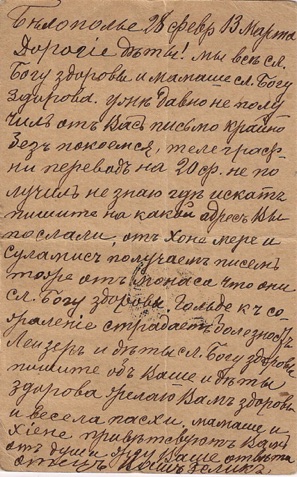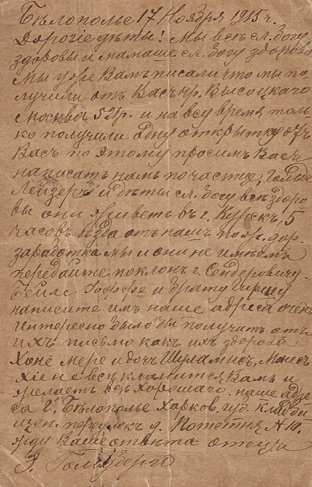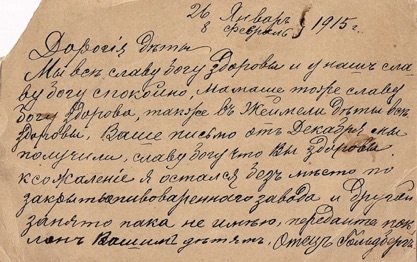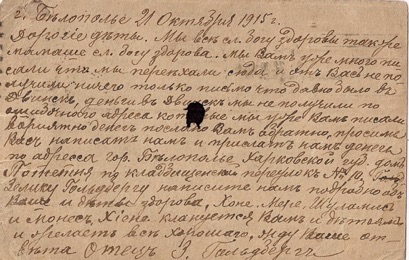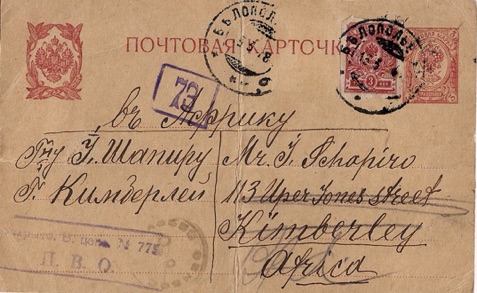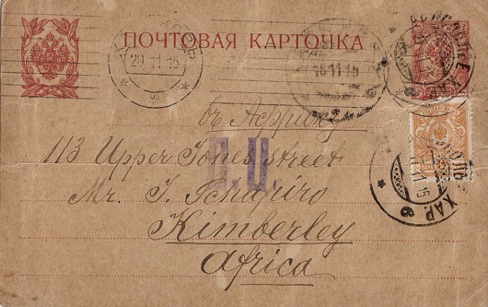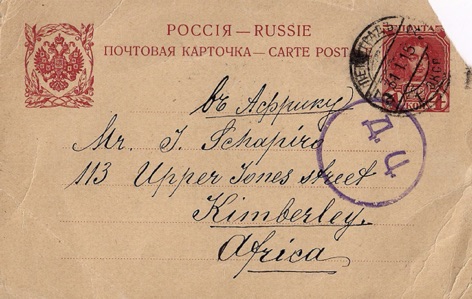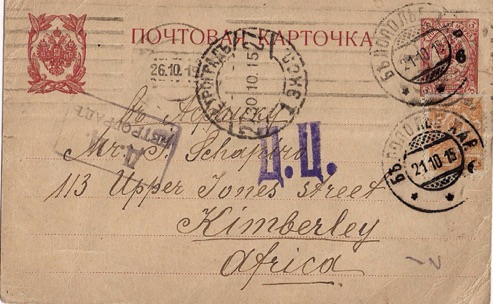Kimberley, South Africa


Shapiro, Woolf (Willie)
Woolf (Willie) Shapiro
Compiled by Geraldine Auerbach MBE London, January 2020
from Information supplied by his nephew Eitan Levy of Israel.
This includes pictures and translations of the postcards sent to Willie’s father Haim Isaac Shapiro in ‘Kimberley Africa’ from his father-in-law in Russia 1914 – 1917 (some of which mention Wissotzky Tea and sending regards to Mr Senderovitz - see Senderovitz, Raphael who had been a ‘tea-taster’ in Moscow before setting up hi business in Beaconsfield).
Also the memories of Eitan’s great uncle Hyman Levy of early life in SA as a smous.
Woolf (Willie) Shapiro was born in Kimberley (more specifically in Beaconsfield) in March 1909. His bris was performed by Rev H Isaacs in April 1909. At that time, the family were living at 15 Newton Road, Beaconsfield.
Willie had 4 sisters, two born in Shavel and two in Beaconsfield. They were:
1.Rose Leah Shapiro b 1901 Shavel d 1966 SA = married Sholem KLAFF in Lithuania one child Vivian Klaff b 1942 Johannesburg d 2006 Maryland USA
2.Helene Queenie Shapiro, b 1904 Shavel d 1960 Durban = married Hayman Levy two children Anthony (Eitan) Levy b.1940 PE, lives in Israel and Fern Levy b. 1942 PE d. 2006 Wales
3.Beryl Bertha Shapiro, b 1907 Beaconsfield d South Africa not married
4.Dora Shapiro, b 1910 Beaconsfield, died 1983 Johannesburg not married
Willie was a ‘salesman’. He married Esther Leah Myers who was a shoe saleslady. They had no children. She died in 1992 in Johannesburg. He died in December 1975 (probably in Johannesburg but not in Kimberley). This information has been supplied by his nephew Eitan (Anthony) Levy, b 1940 in Port Elizabeth, son of Woolf’s sister Helene Queenie. Eitan also sent me the memories of his great uncle Hyman Levy of life on arriving in South Africa and working as a smous (see below at the end of the article)

Woolf’s father was Haim Isaac SHAPIRO, born in 1876 in Lithuania – possibly in Shavel. The family lived in Kimberley from about 1906 to 1933. Between 1914 and 1916 they were living at 113 Upper Jones Street, Kimberley. We know this because Eitan has several postcards that were sent to Isaac Shapiro at that address from his father-in-law who at the time had suddenly relocated from Lithuania to the Kharkov district of Ukraine.
Eitan found a document stating that Isaac Shapiro was on the voters roll for Beaconsfield in 1927, #2985, polling district #80, and his address is given as 13 Dixon Place. He was a clerk in the employ of Siew & Co, Merchants, Market Square. Also in the affidavits, Isaac Shapiro "applied for and was granted a certificate of naturalization conferring upon him the status of a British Subject" and that "the said certificate was issued to him in the year 1910 shortly before the Union of the four provinces of this country took place." Haim Isaac Shapiro died on 14 Feb 1933 in Kimberley. He is buried (grave #20) in the West End or Green St Cemetery, Kimberley. At the time of his death the family address was 5 Free State Road Beaconsfield.
Haim Isaac’s daughter Dora Shapiro, appeared in the Voters Roll of 1933 for Beaconsfield (Polling District 76) residing at 5 Free State Road. She was a teacher. There was evidently some problem with Dora proving she was a citizen. At last her affidavit was signed in 1939 and her address was in Johannesburg, so she left Kimberley between 1933 and 1939. She died in 1983 in Johannesburg. Dora and Beryl never married and had no children.
Woolf Shapiro’s mother was Roddeh (Rhoda) Shapiro, née Goldberg, born in 1874 in Shavel, Lithuania. She died on 03 Dec 1946 in Johannesburg.
Roddeh’s father Zelig Goldberg – who seems to have suddenly moved from, Lithuania to Ukraine and were there between 1914 and 1916 (probably forcibly moved or fled during the first world war when the Russian authorities felt that the Jews would take the German side or be spies for the Germans). At this time Zelig Goldberg corresponded by postcard with his son-in-law Itzhak (Haim Isaac)Shapiro who was living at 113 Upper Jones Street in Kimberley, saying that the family were in good health (thank God) but were desperate for money as there was no work to be had there. Eitan says: ‘These postcards were sent from the Ukraine, not Lithuania, but from the postcards it appears that they had recently moved there. Zelig mentions other family members too – who may also have been moved from their homes in Lithuania. Zelig's granddaughter (my late mother's cousin) is still alive but she was born in 1923 in Lithuania and knows nothing about the Ukraine episode.’
Eitan says that of interest in these postcards are the references to Wissotsky in postcards 2,4,5,6 in regard to the transfer of money. Wissotsky was the largest tea distributor in Russua (now in Israel). Wikipedia says it was “Founded in 1849 in Moscow. It became the largest tea firm in the Russian Empire. By the early 20th century, it was the largest tea manufacturer in the world. Evidently Jews in South Africa were able to send money to relatives in the Russian Empire through Wissotsky Tea Company. Eitan says: ‘I presume sending money through other channels was either illegal or expensive. I have no idea if Wissotzky did this as a gesture/favour to the Jews or whether it was a sideline business with a commission. I would imagine that the amounts transferred would not be significant to the "largest tea manufacturer in the world." (Perhaps we should ask the ‘SA-SIG Forum’ how money was transferred to families back home)
I (Geraldine) noticed that in a couple of the postcards, Zelig Goldberg asked Haim Isaac Shapiro to give his regards to Mr Senderovitz. There was indeed a Mr Senderovitz in Kimberley at that time. He was a well to do businessman, mill owner and wholesale merchant on the market square in Beaconsfield. He was the great-grandfather of Gwynne Robins (née Schrire) who sent in a full story about him that can be seen on the Kimberley Jewish Community website at https://kehilalinks.jewishgen.org/kimberley/Senderovitz.html . Reading that story, it appears that although Raphael Senderovitz was from Kelm, he is cited as having been a ‘tea taster in Moscow’. That surely means he would have been working for Wissotzky Tea company! Is this the link we are looking for? Might this have been a private arrangement between Senderovitz and Shapiro, or was it more widespread? How did people send money back home for their relatives to travel to South Africa or to maintain themselves back home I wonder?
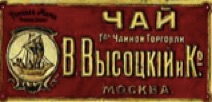
I looked up the Wissotzky tea company in Wikipedia. It was Jewish owned. Zeev Kalonymus Wissotzky, had founded the tea company carrying his name in Moscow in 1849. By in 1885, he was a wealthy and influential man, and was called the " Russian king of tea".
Above: the Wissotzky Tea logo, Russian Empire Below Zeev Kalonymus Wissotzky

In the early 20th century between 1900–1919: Wissotzky Tea soon gained devoted customers all over the Russian Empire. By 1904 the company extended its activities to Germany, France, New York and Canada. In 1907 Wissotzky established the Anglo-Asiatic company with its head offices in London, managed by Ahad Ha'am, a renowned Jewish writer and philosopher. He had joined the company in 1903 on his resignation as editor of Ha-Shiloach, a Zionist journal. The company acquired plantations in both India and Ceylon (present day Sri Lanka).
From the early 1900s through 1917, Wissotzky Tea Company was the largest tea company in the world. Following the Bolshevik Revolution, in 1917 all private businesses in the Russian empire were immediately nationalized by the government, yet it took two more years to complete the takeover of Wissotzky Tea. This is mostly due to the social benefits provided by the company to their many employees.
In 1917 the company gradually ceased its operations in Russia, and the Wissotzky family emigrated to the U.S and Europe, opening branches in Italy, Danzig, Poland, and additional European countries. During the Russian revolution, an antisemitic ditty mentioning Wissotzky tea made the rounds of Russian society, spreading the idea that Russia was the victim of Jewish domination: "Tea of Wissotzky, Sugar of Brodsky, and Russia of Trotsky.”
At a recent Wissotzky Tea Ltd. exhibit at a New York Yiddish song festival — the company, now run by the family’s fifth generation, currently goes by the name Osem USA — a map showed the company’s growth from its beginnings in 1849 in Moscow; to London in 1907; to Poland in 1917; to Israel in 1936, and worldwide in 1961. “Did you know there’s a song about Wissotzky tea?” I asked one of the reps who shook his head. So I called Joshua Waletzky, who wrote both the words and music to ‘Wissotsky’s Tea” which, he said, “was based on a monologue by Sholom Aleichem and was first performed in 1972 for an original musical at Camp Boiberik…. It’s about Gitl ‘Purishkevich,’ who makes a living selling Wissotzky’s teas. Her son was drafted into the czar’s army, and, unlike the rich, she can’t buy his freedom. So she goes to the gallery at the Duma, where the antisemite of the time, Purishkevich, is accusing the Jews of being disloyal [because] not a single Jew is in the army…. Before being thrown out of the gallery, Gitl shouts: ‘What about my Moishe!’ That’s how she became known as Gitl ‘Purishkevich.’” As for the song’s refrain — “Ay-ay ve-dig-a-day-day… Wissotzky’s tea! Ay-ay…. Please buy!” — what a great commercial jingle!
Early days in South Africa 1896 – 1900
Hyman Levy’s memories
The following is compiled by Geraldine Auerbach MBE, London, January 2020, based on a handwritten transcript by Sam Levy of the recollections of his father (Hyman Levy) of his first years in South Africa. The document is undated, and the original is with Jeffrey Geffen, Hyman’s grandson. It was sent to Geraldine Auerbach in London by Hyman Levy’s grandnephew, Eitan Levy, in Israel.
Lithuania
Hyman Levy was born in the village of Louvits? in Lithuania in April in 1876. His family moved to Skood in the district of Kovno when he was aged four or five years old. He went to a Jewish school and, as was common in that area, he learnt reading and writing in Russian and German as well as in Hebrew. He spoke Yiddish at home. Hyman’s father was a farmer. He used to deliver goods from a station 30 miles away to local shops.
Emigration
Hyman’s eldest brother, Moshe Leibe Levy, had has already gone to South Africa. He was married and his first child was born in Lithuania. When Hyman was about eighteen, Moshe Leibe send money for him to come out too. So, Hyman too left home, travelling by boat via the Latvian port of Libau to Hull in England. From there he went by train to London. After staying in London for about a week (probably at the Jew’s Temporary Shelter – built for this purpose) he went to Southampton to board the Garth Castle bound for South Africa. He arrived in Cape Town in 1896.
Cape Town
Moshe Leib (now called Morris) met him at the docks and put him up at his house in Tennant Street in District 6, in Cape Town. Moshe Leib was then a traveller in drapery. He stood him security at Garlicks, and Hyman went out travelling in drapery for the first year. It was heavy work carrying a bundle of drapery on his back and tray of smous in front. Sundays he collected his money.
Johannesburg
He had two uncles in Johannesburg, his mother’s brothers named Michaelsons (stepbrothers to his mother). One was working for his brother who had a fruit stall on Johannesburg market. The latter asked Hyman to come up. He was pleased to make the change and was able to pay his own train fare to Johannesburg. The journey was very slow - when the train was going up an incline the passengers disembarked and walked and then got on.
In Johannesburg he stayed with Michaelson - who then had to sell his business because he had been burgled and Hyman was thus left stranded. He then went to stay in a boarding house in Commissioner Street. He had to ask for credit to be allowed to stay and look for a job. He met there a Mr Hurwitz and Mr Cohen from Skood. The former gave him a job in his general shop on Robinson's {farms} at £5/-/- a month with board and lodging. (Could be on the West Rand)
After a few months this business was also sold, and as Hyman was unskilled and business was bad, he went to the market to verify what he had heard, that a Landsman, Mr Arenfred, had a shop in Rustenburg and was looking for a smouser. Hyman says he didn't go into business with his brother Moshe Leibe because his brother was returning to England where he stayed in Aberdeen in Scotland for two years – during the Boer War between 1899 to 1902. Hyman said he Morris had earned the fare by buying and selling property, on money advanced by the bank.)
Rustenburg
At the market he asked the farmers to take him to Rustenburg to Ahrenfred. They offered to take him {free}. He packed up and loaded up. The journey by ox wagon, took three days. Hyman was dropped at a point ten miles from this shop and had to walk the rest of the way. The next day the farmers delivered his luggage at Mr Ahrenfreds.
Mr Ahrenfred recognised him and knew who he was. He arranged to pay Hyman £15 per month plus food. He explained that Rinderpest was prevalent and therefore oxen were impossible to obtain for smousing and that donkeys only were available for spanning in. Mr Ahrenfreds's clerk’s father, also a Jew, wished to accompany Hyman on his smousing trips.
Du Plessis (a local farmer) provided the wagon and donkeys on hire and the farmer drove. They went way for two months and disposed of all the goods before returning. Most of the trade was with natives and to a lesser extent with farmers. They got some cash in return for their goods, but mostly exchanged goods for mealies and corn. The also offered payment by instalments. They paid the equivalent of 18/- a bag for mealies and were able to sell them for 30/- a bag. At Machadodorp {Rovincross bros} had a shop. A that time, the law was that a smous could only remain there for 24 hours.
Branching out on his own
Then it seems that Hyman branched out on his own. He travelled to Johannesburg in search on new merchandise. It took three days by Ox-wagon, but he was given a free trip as the Dutch farmers knew him well and did not charge him for travel or overnight stays. They treated Jews very well.
On arrival there, he stayed again at the boarding house in Commissioner Street and bought unframed pictures. He returned to Rustenberg with the pictures and stayed with Theunis Eloff - Paul Krugers son-in-law and Piet Triechardt - son of Commandant Triechardt (a school master). This man gave Hyman drapery for him to smous – with the profits to be shared. He had the use of a wagon with 6 donkeys.
The Boer War 1899-1902
Hyman continued to smous in the Rustenburg area until war broke out in 1899. As these itinerant traders offered extended credit terms, when war broke out, the farmers and natives had no way of paying and so everything was lost. He then joined up in the Rustenburg Commando under Casper Du Plessis, Paul Kruger’s brother-in-law, who was in charge of the mounted commando. He was taught to fire a Mauser (small) by the farmers and they moved off to Derdepoort on the border of Bechuanaland.
Part of the commando went to fight at Gaberones. They heard that Plummer was coming up to relieve Mafeking by going through 14 streams and they tried to prevent this. He remained with 40 men in the laager (50 wagons) at Derdepoort. The laager was triangular. Sentries used to be posted outside. One Friday night he was on Brandwag from 10.00pm – 12 midnight.
He returned at 12 and went to sleep in the wagon tent. He put his rifle in the tent when suddenly he heard shots. He got up and saw men running with their rifles inside the laager. He got up and got his rifle. The fieldcornet Stofberg (school master) and he met Mr Haarhof and his two sons who showed Hyman where to take up his position - on the ground outside the laager and to fire in a certain direction. He informed Hyman that they were being attacked by Natives with assegai and rifles. The engagement lasted one hour, and they lost all their oxen and horses.
The English were also attacking with Maxims but when they found that Natives were attacking, they broke off. The natives burned the houses.
Here the document unfortunately abruptly ends. There is archival proof that Hyman Levy was captured by the British and was prisoner of war #17122. According to the records, he was captured on 19 November 1900 and gave his age as 24. Thus, he was born in 1876.
Postcard 1
Belopolye, 2 Feb 13 March
Dear children! We are all in good health, thank God, and mother is good health thank God too. We have not received a letter from you for a long time, we are extremely worried, and we have not received the telegraph money transfer of 20 sr I do not know where to search, write which address you sent them to, from Choneh mere and Sulamith we do receive letters as well as from monas that they are in good health, thank God. Golde unfortunately suffers from an illness. Leyser and the children are in good health thank God. Write about yourselves and the children health, I wish you health and happy Passover. Mother and Chiene send you their greetings from the bottom of their heart. Awaiting your reply, your Zelig.
Postcard 2
Belopolye, 17 December 1915
Dear children! We are all in good health thank God and mother is good health thank God too. It is astonishing that we do not receive letters from you, that we received S21 r from you via V. Wyssotsky, Moscow. I wrote to you. Golde Leyzer and the children are in good health, thank God. She lives in the city of Kursk 6 hours of travel neither we nor them have income. Write to us about yourselves and about the children are you in good health my address is the city of Belopolye, Charkov Guberniya, Kladbishenskaya St., House #10, Potetni. I am waiting for your letter
Father Goldberg.
Postcard 3
Belopolye, 25 September 1916
Dear children! We are all in good health, thank God, and mother is good health, thank God, too. Yesterday we received your letter of 17 August and (deleted) 10 F. We are very happy to hear you are all in good health and are greatly thankful for your amiability here everything is as it used to be no story, last week I wrote to you that we had received 5 sr write to us about the children’s health and your health and how your trade goes. Choneh mere, Sulamith and Chiene with her husband send their greetings. Your father Zelig.
Postcard 4
Belopolye, 16 June 1916
Dear children! We are all in good health, thank God, and mother is good health thank God too.
Today I have received via Visozkiy Moscow a draft of 5 sr which you sent on 1 May this year. I am very grateful to you for your amiability. Here everything is as it used to be. About the 30 sr. which you sent us to Dvinsk a very long time ago and then you directed to send them to Wyssotsky Moscow so there is no news it is probable that Wyssotsky has not received them yet. Choneh mere, Sulamith and Chiene with her husband send their greetings and wish you health and all the best. Waiting for your answer. Your father Zelig.
Postcard 5
Belopolye, 17 November 1917
Dear children! We are all in good health, thank God and mother is good health thank God too. We have already written to you that we received from you via Wyssotsky Moscow S21 r. and during all this time we have only received one postcard from you and this is why we ask you to write to us more often. Golde Leyzer and the children are in good health thank God they live in the city of Kursk, 5 hours of travel from us by train neither us nor they have any income send a bow to Mr. Senderovich, to Beile Sofere and brother Hirsh send them our address it would be very interesting to receive a letter from them how is their health Choneh Mere and daughter Shulamith, Mones Chiene all bow to you and wish you all the best our addresses are the city of Belopolye Charkov Guberniya Kladbishenskiy lane house Potetnya #10. Awaiting your answer your father Z. Goldberg
Postcard 6
Belopolye, 4 May 1916
Dear children We are all in good health thank God and mother is good health thank God too. Your letter and draft of 8 sr via V. Wyssotsky Moscow we received and we thank you for this, after this there was none Choneh wrote to you that we received all the money sent to us except the money sent to Dvinsk addressed to Ryazanskiy we have not received it is remarkable that you do not receive our letter we (illegible) send you a letter, I am asking you to write to us about the health of you and the children, Choneh, mere sulamith Chiene with her husband wish you all the best I am waiting for your answer
Father Zelig
Postcard 7
Belopolye, 1 March 1916
Dear children! We are all in good health thank God and mother is good health thank God too. Amiable Rhodeh your postcard letter of 20/1 we received the other day I also wrote to you that after 8 sr we received 5 sr I thank you very much that you help us in your critical situation we have no income here now we prepare for Passover we will order and all the other edibles it is possible to come by but they are of course expensive write to us about your and the children health also from Beile and Senderovich how are they Choneh mere and their daughter mones Chiene sends a bow to all of you and wishes you all the best write to us father Goldberg
Postcard 8
Belopolye, 20 September 1917
Dear children! We are all in good health thank God and mother is good health thank God too. It is incredible and we are extremely worried to not have received a letter from you for 6 months already only 6 weeks ago we received one letter from you that you are apprehensive about sending us money for it is delayed, from Hirsh Segel we received a letter in July with 5 sr. Choneh got a job in the Novgorod guberniya he is leaving in several days. Mere with the daughter will travel to him by train (illegible) for 2 days, Golde is getting better thank God. Leyser and the children are in good health thank God write to us about your and the children health hearty greetings to you and the children mere, Chiene with her husband wishing you health and all the best awaiting your answer your father Zelig
Postcard 9
Belopolye, 14 March 1916
Dear children! We are all in good health thank God and Mother is in good health thank God too. Your postcard letter of 3/11 we received yesterday thank God you are all in good health, regarding your question how much money we had received I inform you that except for the money received via moscow we received 3 times i.e. 8,, 5 and 10 sr. we are very thankful to you that you help us in our distress. We are now preparing for Passover everything can be found (deleted) that you ask us to write you more when times are better we will write to you we write to you not received yet wishing you good health greetings to the children Isaac and Mr. Senderovich waiting for your answer father Goldberg
Postcard 10
Belopolye, 26 January 1915
8 February
Dear children
We are all in good health thank God and thank God it is quiet here mother is good health thank God too, also in Zeimelis the children are all in good health. Your letter of December we have received, thank God you are in good health. Unfortunately I have lost my job due to the closure of the brewing factory and I still have no other job. Send a bow to your children. Father Goldberg.
Postcard 11
Belopolye, 21 October 1915
Dear children. We are all in good health, thank God and also mother is in good health thank God too. We have already written a lot to you that we moved here and have not received anything from you just the letter of a long time ago to Dvinsk, we have not received any money to Dvinsk at the wrong address which we have already written to you the money must have been sent back to you we are asking you to write to us and send us money to the address the city of Belopolye, Charkov Guberniya, House Potetnya on Kladbishenskiy lane #10 to Zelig Goldberg write back to us about your and the children health, Chone, Mere, Shulanith and Mones, Chiene bow to you and to the children and wish you all the best. Waiting for you answer Father Z. Goldberg
POST CARD
To Africa
Mr. J Schapiro
113 Upper Jones Street
Kimberley
Africa
